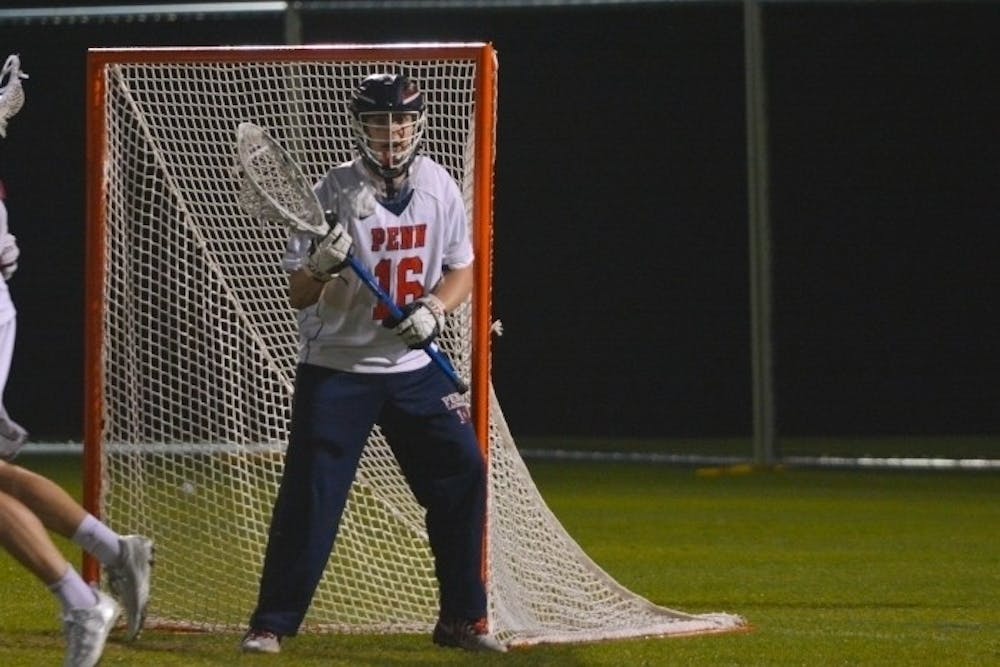
Sophomore goalie Reed Junkin kept Penn men's lacrosse afloat as long as he could with some fantastic overtime saves, but he was unable to grab a win in one of the greatest games in school history.
Credit: Ananya ChandraHeartbreak for Penn men’s lacrosse.
Despite playing one of their best all-around games of the season, the Quakers (7-6, 3-3 Ivy) fell at the hands of the top-seeded Yale Bulldogs in the Ivy League Tournament semifinals, 13-12, after a tournament-record four overtimes.
For fans of Penn lacrosse, the game was eerily and sadly reminiscent of last year’s semifinal matchup in which the Red and Blue lost to the same opponent, by the same margin.
However, this game was different. This game was epic.
After a fast-paced first quarter in which Penn scored six goals and Yale (9-5, 5-1) scored five, it appeared as if goalie play and defense would be nonfactors. But, in typical Penn-Yale fashion, the game slowed substantially in the next three quarters, with the two squads trading goals, saves, and ground balls throughout.
Catalyzing the goals for the Quakers was the surprisingly even play at the faceoff “X” where Penn’s Chris Santangelo and Richie Lenskold combined to win 14 of 31 draws against the top faceoff man in the Ivy League, Yale’s Connor Mackie.
Those faceoff wins proved crucial, as both offenses were laden with deadly accurate shooters during regulation. Yale’s All-American duo of Ben Reeves and Eric Scott combined for 10 points, as they worked in tandem, drawing the attention of Penn’s defense throughout.
On the other side of the field, the Quakers were led by midfielder Reilly Hupfeldt and attackman Kevin McGeary. McGeary’s four points paced the Red and Blue offense, as the junior weaved in and out of his dodges uncorking his high octane shot with his patented lightning-fast release. Speaking of high octane shots, fellow junior Hupfeldt delivered missiles from the outside, scoring two of his three goals in the fourth quarter from the top of the box. Not only were his shots powerful, but they were also timely, twice giving Penn the lead in the fourth.
Unfortunately for the Quakers, those leads would not hold up, as the Bulldogs answered everything Penn had to offer, scoring with just 53 seconds left to force overtime when Reeves beat Penn goalie Reed Junkin with a low bouncer.
Although Junkin was susceptible to shots such as Reeves' during regulation, the sophomore netminder played arguably the best lacrosse of his collegiate career in overtime, stuffing Yale attackmen from point-blank range on multiple occasions. It was as if Penn coach Mike Murphy made a goalie switch entering the extra sessions. The player who conceded 12 goals to only eight saves in regulation was not the guy in cage in overtime. That version of Reed Junkin stopped a remarkable five shots, most of which were wide open looks, before conceding the game-winner in the fourth overtime.
The path to that fourth overtime was as wild as the score would indicate, with many questionable calls going in Yale’s favor. For instance, as sophomore midfielder Tyler Dunn was running into the box during the second overtime, he quickly became engulfed by a sea of Yale defenders. While it looked as if coach Murphy and his staff were screaming for a timeout on the sidelines, the officials never granted it. As a result, Dunn lost the ball, and McGeary was assessed a holding penalty on the subsequent ride. However, a penalty was not assessed to Yale on a similar play in the next overtime period, when senior defensive midfielder Austin Kreinz appeared to be raked around the head in much the same fashion that warranted a call in Yale’s favor merely a few minutes earlier.
Still, the officials cannot be blamed entirely for the contest’s outcome, and they certainly did not diminish the overall quality of the game, one that will surely be in the conversation for Division I lacrosse’s game of the year. Yet, while many spectators and pundits undoubtedly enjoyed the rip-roaring affair, the entire Penn men’s lacrosse program, especially the seniors, must first overcome the heartbreak.
Players like All-Ivy defenseman Kevin Gayhardt, star coverman Eric Persky and groundball and clearing machine Austin Kreinz will never again suit up for the Red and Blue. After their undeniable contributions to the culture of the program and the quality they contributed to the overall gameplay, the loss of this senior class — the one which helped Penn bring in its only Ivy tournament title in 2014 — cannot be overstated.
That being said, the Quakers have a bright future. The team’s leading scorer, Simon Mathias, was only a sophomore this year, and fellow offensive stars Hupfeldt and McGeary will be back as well. Statistically speaking, almost the entire offense returns, and with the emergence of freshman attackman Adam Goldner in recent weeks, the Quakers are only improving on that end.
Most importantly, after an up-and-down year in cage, sophomore Reed Junkin played his best in the biggest moment, suggesting that the Quakers will be ready for the spotlight next season, ready to finally get over the hump and snag their first Ivy regular season championship in three decades.
The Daily Pennsylvanian is an independent, student-run newspaper. Please consider making a donation to support the coverage that shapes the University. Your generosity ensures a future of strong journalism at Penn.
Donate







